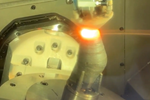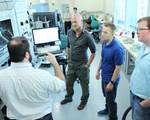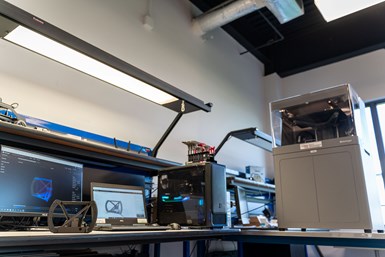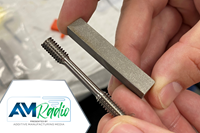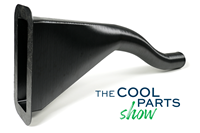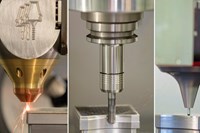Markforged Adds Simulation Feature to Additive Manufacturing Software
The software’s virtual testing can validate the strength of advanced composite parts and automatically optimize print parameters to lower cost and speed production.
Share
Read Next
Larsen Motorsports used Markforged’s Eiger simulation feature to design and print a continuous carbon fiber-reinforced Onyx steering wheel strong enough to replace aluminum.Photo Credit: Markforged
Markforged has added new simulation features to its additive manufacturing (AM) software. The simulation is available as a free trial until April 2023, and as a paid subscription thereafter. The virtual testing validates the strength of advanced composite parts and automatically optimizes print parameters to lower cost and speed production, the company says.
Incorporating 3D printing into tooling and end-use applications requires total confidence in part strength. By replacing slow and costly design/print/break testing cycles with virtual testing, Simulation enables manufacturers to expand their use of AM into the most demanding production applications.
Larsen Motorsports builds jet engine drag racing vehicles that hurtle past 280 mph. But stock aluminum steering wheels are shaped for much larger hands than those of their award-winning driver, Josette Roach, putting safety and performance at risk. Larsen Motorsports used Simulation to design and print a continuous carbon fiber-reinforced Onyx steering wheel strong enough to replace aluminum. “We can now test it with Simulation, iterate and keep iterating until we get a design we're happy with,” says Brian Tocci, director of operations, Larsen Motorsports. “We don't have to print 10 different parts. We can do it all in Simulation.”
Unlike traditional software tools that need specialized expertise and time-consuming analysis, Simulation is designed for AM and works within the familiar Eiger slice-and-print workflow. The company says any user can validate part strength and stiffness through virtual testing by identifying anchor and load surfaces, and then entering values for loads, factor of safety and maximum deflection. They can then optimize parts by automatically determining print settings for floors, walls, infill and fiber reinforcement to achieve cost and speed goals while maintaining adequate strength.
“Simulation enables our customers to adopt The Digital Forge deeper into their manufacturing operations by replacing more mission-critical tooling and end-use metal parts with validated and optimized 3D printed advanced composite parts with continuous fiber reinforcement,” says Shai Terem, Markforged president and CEO. “Cloud-based software innovation like Simulation is core to our mission to bring industrial part production to the point of need.”
-
Learn how Markforged’s cloud-based software manages distributed manufacturing operations on an enterprise and global scale with increased efficiency and insight.
-
Read how Markforged partnered with 3YourMind to integrate its Eiger software platform with 3YourMind’s manufacturing execution software (Agile MES) and other life cycle management tools via API.
- Check out this story about how Markforged is helping nonprofit Automation Alley with its initiative to create a network of 3D printers at more than 300 Michigan manufacturers — a network which can be activated in case of future emergencies.
Related Content
-
Additive Manufacturing Is Subtractive, Too: How CNC Machining Integrates With AM (Includes Video)
For Keselowski Advanced Manufacturing, succeeding with laser powder bed fusion as a production process means developing a machine shop that is responsive to, and moves at the pacing of, metal 3D printing.
-
DMG MORI: Build Plate “Pucks” Cut Postprocessing Time by 80%
For spinal implants and other small 3D printed parts made through laser powder bed fusion, separate clampable units resting within the build plate provide for easy transfer to a CNC lathe.
-
10 Important Developments in Additive Manufacturing Seen at Formnext 2022 (Includes Video)
The leading trade show dedicated to the advance of industrial 3D printing returned to the scale and energy not seen since before the pandemic. More ceramics, fewer supports structures and finding opportunities in wavelengths — these are just some of the AM advances notable at the show this year.


